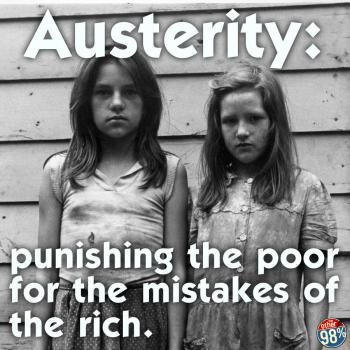The EU establishment has been held to account for the euro mess, for austerity policies that turned recession into depression, for the galloping inequality, and for the millions and millions of unemployed. The austerity policies pursued in the UK and elsewhere, is deeply disturbing. When an economy is already hanging on the ropes, you can’t just cut government spendings. Cutting government expenditures reduces the aggregate demand. Lower aggregate demand means lower tax revenues. Lower tax revenues means increased deficits — and calls for even more austerity. And so on, and so on. Without a conscious effort to counteract the inevitable forces driving our societies towards an extreme income and wealth inequality, our societies crackle. It is crucial to have strong redistributive policies if we want to have stable economies and societies. Redistributive taxes and active fiscal policies are necessary ingredients for building a good society. Societies where we allow the inequality of incomes and wealth to increase without bounds, sooner or later implode. The cement that keeps us together erodes and in the end we are only left with people dipped in the ice cold water of egoism and greed. In the economy it is money that counts. In a democracy it is votes that counts.
Topics:
Lars Pålsson Syll considers the following as important: Economics, Politics & Society
This could be interesting, too:
Lars Pålsson Syll writes Schuldenbremse bye bye
Lars Pålsson Syll writes Vad historien lär oss
Lars Pålsson Syll writes What’s wrong with economics — a primer
Lars Pålsson Syll writes Krigskeynesianismens återkomst

The EU establishment has been held to account for the euro mess, for austerity policies that turned recession into depression, for the galloping inequality, and for the millions and millions of unemployed.
The austerity policies pursued in the UK and elsewhere, is deeply disturbing. When an economy is already hanging on the ropes, you can’t just cut government spendings. Cutting government expenditures reduces the aggregate demand. Lower aggregate demand means lower tax revenues. Lower tax revenues means increased deficits — and calls for even more austerity. And so on, and so on.
Without a conscious effort to counteract the inevitable forces driving our societies towards an extreme income and wealth inequality, our societies crackle. It is crucial to have strong redistributive policies if we want to have stable economies and societies. Redistributive taxes and active fiscal policies are necessary ingredients for building a good society.
Societies where we allow the inequality of incomes and wealth to increase without bounds, sooner or later implode. The cement that keeps us together erodes and in the end we are only left with people dipped in the ice cold water of egoism and greed.
In the economy it is money that counts. In a democracy it is votes that counts.
